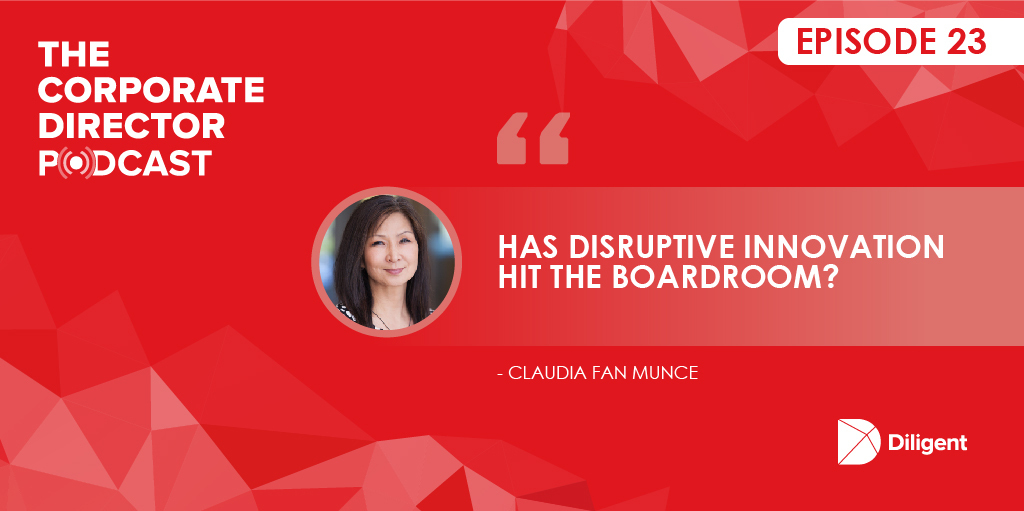Hosts: Dottie Schindlinger, Executive Director of the Diligent Institute, and Meghan Day, Senior Director of Board Member Experience for Diligent Corporation
In this episode:
- How has the nature of innovation evolved? Munce discusses the shift from inventions to iteration, and Christensen’s “future-back” strategy model.
- How can directors dig into innovation in a constructive and productive way? Munce talks about expanding the depth and breadth of board expertise.
- Corporate directors are expanding their perspectives. The traditional “board book” from management is an increasingly small part of meeting—and year-round—preparation.
Summary:
Change is happening at lightning speed. In fact, the National Association of Corporate Directors reported that nearly 7 in 10 (68%) of directors believe their company will not be able to extend its historical strategy over the next five years.
Dr. Clayton Christensen tackled this issue with his 1997 book The Innovator’s Dilemma. And so has Claudia Fan Munce as a co-founder and managing director of the IBM Venture Capital Group.
Munce shares with Diligent Institute Executive Director Dottie Schindlinger her perspectives on Christensen’s work and legacy, plus her own thoughts on innovation as a board member today. Also in this episode, Diligent Institute Head of Research Annie Kors shares highlights from a just-released report, Beyond the Boardroom: How Corporate Directors Gain Insight, with Meghan Day, Diligent’s Senior Director of Board Experience.
How has the nature of innovation evolved?
“I strongly believe that the most valuable output [of the IBM Venture Capital Group] was the insights that we brought in.”
– Claudia Fan Munce, Director for CoreLogic and Best Buy and former Managing Director of the IBM Venture Capital Group
Munce talked about how she’s seen the nature of innovation change over 30-plus years with IBM, from her early days in r&d for the magnetic disk drive—a transformative technology Christensen cited in his work—to sourcing innovation like a venture capitalist for one of the world’s largest corporations.
With key innovations like WiFi or the magnetic disk drive, the traditional research process can take years and follows a clear path: establish capabilities, get the technology to work, and get the standards established. Today, innovation is more of an exercise in rapid iteration—and the time frame for showing results has shrunk from years to months.
In this environment, the worst thing a director can do is sit on the sidelines and study a situation ad infinitum. Citing Christensen’s “future-back” strategy, Munce advises working swiftly to absorb input from the surrounding environment—market partners, users, academic research, and beyond—and innovating continuously through those cycles. You don’t have to reinvent the wheel, but you do have to be aware of what’s happening around you and the assets you can leverage.
“Any signal change that may be relevant to your business, you should try to understand what that means to you as a company or to your competitors’ business,” she says. “Then you need to define or fine-tune your strategy to respond. It can be a threat, or it can be an opportunity.”
How can directors dig into innovation in a constructive and productive way?
“The world is changing so much and so fast. We all need to learn, and the good board members are continuously learning new things and gaining new skills and perspectives.”
– Claudia Fan Munce, Director for CoreLogic and Best Buy and former Managing Director of the IBM Venture Capital Group
According to Munce, a corporate director has the unique responsibility from a cultural and strategy perspective to make sure the company isn’t inventing things that aren’t needed or inventing things from scratch. What can the company bring in from the outside to combine with internal capabilities? How can the company address new markets and new functionalities?
Asking questions like these requires both a diversity of perspectives among board members and in-depth knowledge by each individual director. Munce shares an example of such complementary intelligence at work. She expands her understanding of disruptive innovation by reading new business plans from startups while a fellow board member, who is a CMO, contributes the latest insights on trends and approaches from the marketing world.
“Directors want to be able to ask the right questions. But understanding what questions to ask requires the directors to really investigate learning and seeking insights themselves.”
– Claudia Fan Munce, Director for CoreLogic and Best Buy and former Managing Director of the IBM Venture Capital Group
What are directors doing to get the information they need to keep up?
71% of public company directors, and 65% of directors overall, do their own independent research in preparation for meetings, in addition to reading the reports from management.
Many of today’s directors are proactively seeking knowledge, according to new research by the Diligent Institute. In fact, the days of management-prepared board books as a “single source of truth” are largely over, Kors shares.
Beyond the Boardroom: How Corporate Directors Gain Insight revealed that:
- 65% of directors are spending time gathering independent information about the company as part of their pre-meeting preparation.
- Directors spend 40% of their meeting preparation time engaged in activities other than reading the materials prepared by management.
- 21% of directors’ time is spent conducting their own research, with another 19% spent in conversation with other corporate leaders.
“I’m always consuming information and working with my colleagues, so in that sense, everything I’m doing is preparing for a board meeting,” one survey respondent told the Diligent Institute.
Also in this episode…
Schindlinger and Munce envision a future of “gamified” board rooms and talk about Munce’s work with Parity.org, which aims to bring more qualified women into vice president, executive, and board roles.
Listen to Episode 23 on Apple Podcasts
Episode resources:
The Essential Clayton Christensen Articles
2019-2020 NACD Public Company Governance Survey
“Beyond the Boardroom: How Corporate Directors Gain Insight”
“2020 Outlook: the State of Modern Boardrooms” Diligent Institute report
“2020 Is the Year of Modern Governance” by Diligent CEO Brian Stafford
Netflix Approach to Governance: Genuine Transparency with the Board


